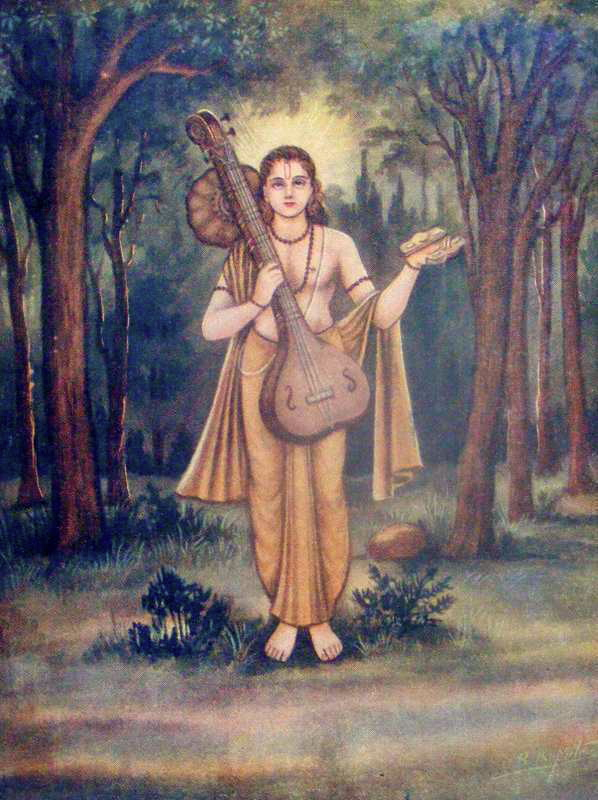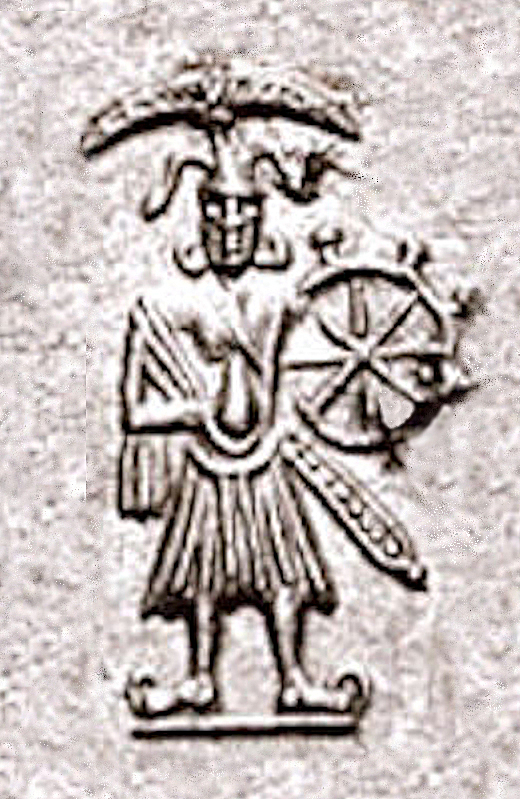|
Narada
Narada (, ), or Narada Muni, is a sage-divinity, famous in Hinduism, Hindu traditions as a travelling musician and storyteller, who carries news and enlightening wisdom. He is one of the Manasputra, mind-created children of Brahma, the creator god. He appears in a number of Hindu texts, notably the Mahabharata, telling Yudhishthira the story of Prahlada, Prahalada, and he also appears in the Ramayana and the Puranas. A common theme in Vaishnavism is the accompaniment of a number of deities such as Narada to offer aid to Vishnu upon his descent to earth to combat the forces of evil, or to enjoy a close view of epochal events. He is also referred to as ''Rishiraja'', meaning the king of all sages. He was gifted with the boon of knowledge regarding the past, present, and the future. Hinduism In Indian texts, Narada travels to distant worlds and realms (Sanskrit: ''lokas''). He is depicted carrying a khartal (musical instrument) and the veena, and is generally regarded as one of ... [...More Info...] [...Related Items...] OR: [Wikipedia] [Google] [Baidu] |
Narada Jayanti
Narada Jayanti (Sanskrit: नारद जयंती ) is a Hindu festival to celebrate the birth of the celestial sage Devashree Narada. It is considered an auspicious day by Hindus. It is celebrated on the ''Pratipada Tithi'' of '' Krishna Paksha'' in the Hindu Month of ''Jyestha'' across the Indian subcontinent. Background According to Hindu texts, Devashree Narada was the manasaputra of the Lord Brahma. He was the seer of the thirteenth ''sutra'' of the eighth M''andala'' of the '' Rigaveda''. The Vaishnavite community view him as a divine soul who was the devotee of Lord Vishnu. He promoted and communicated the legends of Lord Vishnu among others. His famous praying quotes on Lord Vishnu was He was well versed in Vedas and other texts in Sanatana tradition. Devashree Narada is mentioned in Ramayana, Mahabharata and Puranas, etc. According to the texts like ''Bhakti Purana'' of ''Sanatana Dharma'', the important works attributed to him are Narada Purana, Narada Smr ... [...More Info...] [...Related Items...] OR: [Wikipedia] [Google] [Baidu] |
Narada Bhakti Sutra
The ''Narada Bhakti Sutra'' (IAST: ) is a well known sutra venerated within the traditions of Hinduism, reportedly spoken by the famous sage, Narada. The text details the process of devotion (Bhakti), or Bhakti yoga and is thus of particular importance to many of the Bhakti movements within Hinduism. It has received particular attention among the Vaishnava and Vedanta traditions. Sri Ramakrishna, the mystic-saint, hails this work as, "The best path to union with God is to follow the way of divine love as taught by Narada." Sanskrit scriptures often appear in variant editions which may show differences in organization and verse numbering. For example, in the translation by Swami Prabhavananda there are eighty-four verses arranged in nine chapters, whereas in the Bhaktivedanta Book Trust translation by A.C Bhakti Vedanta Swami Prabhupada and his disciple Satsvarupa dasa the eighty-four verses are organized into five chapters. Chapters As organized by Swami Prabhavananda, ... [...More Info...] [...Related Items...] OR: [Wikipedia] [Google] [Baidu] |
Nāradasmṛti
is a part of the Dharmaśāstras, an Indian literary tradition that serves as a collection of legal maxims relating to the topic of dharma. This text is purely juridical in character in that it focuses solely on procedural and substantive law. Known as the "juridical text par excellence," the is the only Dharmaśāstra text to not cover areas such as righteous conduct and penance.Lariviere 1989: ix Its focused nature has made the text highly valued by rulers and their governments, in Indian subcontinent and southeast Asia, likely as an aid of carrying out their dharma of justly ruling the country. Recensions Today there exist three recognized versions of Naradasmriti, also called Naradiya Dharmasastra. First, there is the “minor” recension, consisting of 879 verses and referred to by the siglum D. Next comes the recension known by the siglum P and consisting originally of 550 verses. Jolly later edited the text to contain verses from the “minor” recension as w ... [...More Info...] [...Related Items...] OR: [Wikipedia] [Google] [Baidu] |
Vishnu
Vishnu (; , , ), also known as Narayana and Hari, is one of the Hindu deities, principal deities of Hinduism. He is the supreme being within Vaishnavism, one of the major traditions within contemporary Hinduism, and the god of preservation (sattva). Vishnu is known as ''The Preserver'' within the Trimurti, the triple deity of Para Brahman, supreme divinity that includes Brahma and Shiva.Gavin Flood, An Introduction to Hinduism' () (1996), p. 17. In Vaishnavism, Vishnu is the supreme Lord who creates, protects, and transforms the Hindu cosmology, universe. Tridevi is stated to be the energy and creative power (Shakti) of each, with Lakshmi being the equal complementary partner of Vishnu. He is one of the five equivalent deities in Panchayatana puja of the Smarta tradition of Hinduism. According to Vaishnavism, the supreme being is with qualities (Saguna Brahman, Saguna), and has definite form, but is limitless, transcendent and unchanging absolute Brahman, and the primal Atma ... [...More Info...] [...Related Items...] OR: [Wikipedia] [Google] [Baidu] |
Yudhishthira
Yudhishthira (Sanskrit: युधिष्ठिर, ud̪ʱiʂʈʰiɾᵊ IAST: ''Yudhiṣṭhira''), also known as Dharmaputra, is the eldest among the five Pandavas, and is also one of the central characters of the ancient Indian epic ''Mahabharata''. He was the king of Indraprastha and later the King of Kuru Kingdom in the epic. Yudhishthira was the son of Kunti, the first wife of King Pandu, fathered by the god Yama due to Pandu's inability to have children. Yudhishthira held a strong belief in ''dharma'' (morals and virtues) and was chosen as the crown prince of Kuru. But after the Lakshagriha incident, he was presumed dead and his cousin Duryodhana was appointed as the new heir. The kingdom was split in half due to a succession dispute between Yudhishthira and Duryodhana. Yudhishthira received the barren half, which he later transformed into the magnificent city of Indraprastha. Yudhishthira and his brothers had a polyandrous marriage with Draupadi, the princess ... [...More Info...] [...Related Items...] OR: [Wikipedia] [Google] [Baidu] |
Narada Purana
The ''Naradiya Purana'' (, ) or ''Narada Purana'' (), are two Vaishnavism texts written in Sanskrit language. One of the texts is termed as a Major Purana, also called a Mahapurana, while the other is termed as a Minor Purana (''Upapurana''), also referred as ''Brihannaradiya Purana.'' Unlike most Puranas that are encyclopedic, the Brihannaradiya text is focussed almost entirely on Vishnu worship, while the Naradiya text is a compilation of 41 chapters (20%) on Vishnu-worship and rest of the chapters (80%) cover a wide range of topics including a large compilation of ''Mahatmya'' (travel guides) to temples and places along the river Ganges and neighbouring regions. The ''Naradiya Purana'' is notable for dedicating eighteen chapters on other Puranas, one entire chapter summarizing each Major Purana. It is also notable for its verses extolling Buddha in chapter 1.2. History Manuscripts of nearly all the major puranas acknowledge the existence of a major purana named eithe ... [...More Info...] [...Related Items...] OR: [Wikipedia] [Google] [Baidu] |
Prahlada
Prahlada () is an asura king in Hindu scriptures. He is known for his staunch devotion to the preserver deity, Vishnu. He appears in the narrative of Narasimha, the lion avatara of Vishnu, who rescues Prahlada by disimboweling and killing his evil father, the asura king Hiranyakashipu. Prahlada is described as a saintly boy, known for his innocence and bhakti towards Vishnu. Despite the abusive nature of his father, Hiranyakashipu, and his uncle and aunt, Hiranyaksha and Holika, he continues to worship Vishnu, and Vishnu as Varaha kills his paternal uncle Hiranyaksha by piercing and crushing him, and Vishnu kills his paternal aunt Holika by burning her to ashes alive, and Vishnu as Narasimha disimbowels and kills his father Hiranyakashipu and saves Prahlada and the universe from destruction and chaos. He is considered a ''mahājana'', or great devotee, by followers of Vaishnava traditions. A treatise is attributed to him in the Bhagavata Purana, in which Prahlada describes t ... [...More Info...] [...Related Items...] OR: [Wikipedia] [Google] [Baidu] |
Puranas
Puranas (Merriam-Webster's Encyclopedia of Literature (1995 Edition), Article on "Puranas", , page 915) are a vast genre of Indian literature that include a wide range of topics, especially legends and other traditional lore. The Puranas are known for the intricate layers of symbolism depicted within their stories. Composed originally in Sanskrit and in Languages of India, other Indian languages,John Cort (1993), "An Overview of the Jaina Puranas" in ''Purana Perennis: Reciprocity and Transformation in Hindu and Jaina Texts,'' (Editor: Wendy Doniger), State University of New York Press, , pages 185-204 several of these texts are named after major Hindu deities such as Vishnu, Shiva, Brahma, and Mahadevi, Devi. The Puranic genre of literat ... [...More Info...] [...Related Items...] OR: [Wikipedia] [Google] [Baidu] |
Bhakti
''Bhakti'' (; Pali: ''bhatti'') is a term common in Indian religions which means attachment, fondness for, devotion to, trust, homage, worship, piety, faith, or love.See Monier-Williams, ''Sanskrit Dictionary'', 1899. In Indian religions, it may refer to loving devotion for a personal God (like Krishna or Devi), a formless ultimate reality (like Nirguna Brahman or the Sikh God) or an enlightened being (like a Buddha, a bodhisattva, or a guru).Bhakti ''Encyclopædia Britannica'' (2009)Karen Pechelis (2011), "Bhakti Traditions", in ''The Continuum Companion to Hindu Studies'' (Editors: Jessica Frazier, Gavin Flood), Bloomsbury, , pp. 107–121 Bhakti is often a deeply emotional devotion based on a relationship ... [...More Info...] [...Related Items...] OR: [Wikipedia] [Google] [Baidu] |
Vaishnava
Vaishnavism () ), also called Vishnuism, is one of the major Hindu traditions, that considers Vishnu as the sole supreme being leading all other Hindu deities, that is, '' Mahavishnu''. It is one of the major Hindu denominations along with Shaivism, Shaktism, and Smartism. Its followers are called Vaishnavites or ''Vaishnava''s (), and it includes sub-sects like Krishnaism and Ramaism, which consider Krishna and Rama as the supreme beings respectively. According to a 2020 estimate by The World Religion Database (WRD), hosted at Boston University’s Institute on Culture, Religion and World Affairs (CURA), Vaishnavism is the largest Hindu sect, constituting about 399 million Hindus. The ancient emergence of Vaishnavism is unclear, and broadly hypothesized as a fusion of various regional non-Vedic religions with worship of Vishnu. It is considered a merger of several popular non-Vedic theistic traditions, particularly the Bhagavata cults of Vāsudeva-Krishna and '' ... [...More Info...] [...Related Items...] OR: [Wikipedia] [Google] [Baidu] |
Vaishnavism
Vaishnavism () ), also called Vishnuism, is one of the major Hindu denominations, Hindu traditions, that considers Vishnu as the sole Para Brahman, supreme being leading all other Hindu deities, that is, ''Mahavishnu''. It is one of the major Hindu denominations along with Shaivism, Shaktism, and Smartism. Its followers are called Vaishnavites or ''Vaishnava''s (), and it includes sub-sects like Krishnaism and Ramanandi Sampradaya, Ramaism, which consider Krishna and Rama as the supreme beings respectively. According to a 2020 estimate by The World Religion Database (WRD), hosted at Boston University’s Institute on Culture, Religion and World Affairs (CURA), Vaishnavism is the largest Hindu sect, constituting about 399 million Hindus. The ancient emergence of Vaishnavism is unclear, and broadly hypothesized as a History of Hinduism, fusion of various regional non-Vedic religions with worship of Vishnu. It is considered a merger of several popular non-Vedic theistic traditio ... [...More Info...] [...Related Items...] OR: [Wikipedia] [Google] [Baidu] |
Veena
The ''veena'', also spelled ''vina'' ( IAST: vīṇā), is any of various chordophone instruments from the Indian subcontinent. Ancient musical instruments evolved into many variations, such as lutes, zithers and arched harps.Vina: Musical Instrument Encyclopædia Britannica (2010) The many regional designs have different names such as the '' Rudra veena'', the '''', the '' Vichitra veena'' and others. The North Indian ''rudra veena'', used in |








